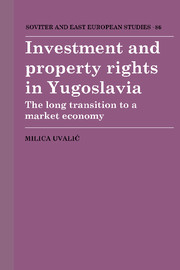Book contents
- Frontmatter
- Contents
- List of figures
- List of tables
- Preface and acknowledgements
- Introduction
- Part I The institutional and theoretical framework
- Part II Empirical evidence on the nature of the Yugoslav system
- Part III Pressure for more radical reforms in Yugoslavia
- 8 Early attempts at introducing investment incentives
- 9 Current property reforms
- 10 Specific features of the Yugoslav transition
- 11 An overview of conclusions
- Notes
- List of references
- Index
- Series list
9 - Current property reforms
Published online by Cambridge University Press: 11 January 2010
- Frontmatter
- Contents
- List of figures
- List of tables
- Preface and acknowledgements
- Introduction
- Part I The institutional and theoretical framework
- Part II Empirical evidence on the nature of the Yugoslav system
- Part III Pressure for more radical reforms in Yugoslavia
- 8 Early attempts at introducing investment incentives
- 9 Current property reforms
- 10 Specific features of the Yugoslav transition
- 11 An overview of conclusions
- Notes
- List of references
- Index
- Series list
Summary
Towards private property: the debates of the 1980s
Investment reforms in Yugoslavia have not produced fundamental changes in enterprise behaviour, because other elements of the system have remained essentially unchanged – in particular, the property regime, as probably the most constant feature of the Yugoslav system over the last forty years (Bonin and Putterman 1987, p. 105). The property issue came to the fore of academic and public discussions in Yugoslavia in the mid-1980s. From the debates, a generally favourable attitude towards the diversification of property rights emerged. The concept of social property, which for years had been taken for granted as one of the fundamental features of the Yugoslav economy (in spite of endless academic discussions about its real meaning), 1 was for the first time openly criticized. There was also a revival of interest in traditional financial instruments; in particular a lively debate on shareholding developed. Although many of the initial proposals sought ways of introducing shareholding without affecting the socialist features of the economy – and in some cases, without affecting the existing framework of social property – they have stimulated discussion and thus have prepared the ground for successive, more radical, reforms of the property regime.
Workers' ‘shareholding’
One of the contributions that revived the debate on workers' shareholding in recent years was by S. Babić. Babić (1983) argued that there is no reason why shareholding by producers should be explicitly prohibited, since the law does not prohibit ownership of incomegenerating assets (e.g. citizens' savings accounts).
- Type
- Chapter
- Information
- Investment and Property Rights in YugoslaviaThe Long Transition to a Market Economy, pp. 176 - 197Publisher: Cambridge University PressPrint publication year: 1992

